Are you thinking of buying cryptocurrency but not sure where to keep it? Everyone knows that crypto coins are stored on crypto wallets, but it is a challenge for an inexperienced person to find the best cryptocurrency wallets online.
You will agree that not all wallets deserve to be trusted since the main problem connected with cryptocurrency is a possibility to steal it by means of hacker attacks.
Good news: this article will tell you about the best crypto wallets on the web, their main features, benefits, and drawbacks for you to find the most reliable platform for your crypto.
What is a Cryptocurrency Wallet?
The definition of cryptocurrency wallet is quite simple and predictable. It is a digital wallet which allows its owner to store, receive, and send cryptocurrency. How can a wallet be digital? In fact, it is software which performs functions of the wallet making it possible to view the balance and make online transactions.
A crypto wallet is a necessity if you want to own or use cryptocurrency because it is the only platform where you can keep it. Unlike fiat money, you cannot take crypto in your hands, put to the bank account or credit card the only thing left is to transfer it to the wallet from the platform where you have purchased or received it.
Cryptocurrency wallets are very different nowadays. Some of them have been designed to store and use only one crypto coin, while the others are suitable for different tokens. There are wallets to be managed by the owner or ones which are custodial.
The number of cryptocurrencies supported by the wallet means that this platform has access to the same number of specific “public addresses’. These addresses are numbers which characterize every account and are used to receive a certain type of crypto. If you want someone to transfer crypto to your account, you give him or her this public address and coins are delivered to your account address. The wallet has access to your address and shows its balance and allows making transactions.
Every non-custodial wallet owner has a private key to the wallet to be able to manage and operate it, while the keys to custodial wallets belong to the 3rd-party organization (e. g. currency exchange, broker, etc.) and users can access their wallets using the password.
Types of Wallets
Since modern technology offers unbelievable solutions to the developers and web engineers, people have received access to online wallets of several types. The division into types depends on several factors including the medium type which is used for wallet storage, who takes control of this wallet, and if any data is stored online in it. Some wallets can have characteristics of several types and are considered more universal ones.
When it comes to the basic types of Bitcoin wallets, they can be the following ones:
- Full Node Wallet
It is a wallet where its owner has full control of private keys and hosts a full blockchain copy. These are usually wallets created by the founders of tokens and are considered official ones with the link from the main coin website. - Custodial wallet
It is a wallet where all the private keys are kept by the third party. - Desktop wallet
It is an application which connects the user to the coin’s client and can be accessed from your PC after downloading and installation. - Mobile wallet
It is an app which runs on mobile devices and performs functions of the wallet. - Online wallet
It is a web-based wallet hosted on the real or virtual server. - Software wallet
It is any wallet based on software. - Hardware wallet
It is hardware such as USB devices which has been created for keeping cryptocurrency and making transactions when they are plugged in and have access to the Internet connection. Disconnected hardware can be transported and stored offline. - Paper wallet
It is a printed copy of QR code which contains a public and private key. It means that you can make crypto transactions from the paper and do not need to store any digital data about your crypto coin. - Coin-specific wallet
It is a wallet for only one crypto coin. - Network-specific wallet
It is a wallet to keep several tokens on one network. - Universal wallet
It is a wallet to hold addresses of many different altcoins.
How to Choose a Cryptocurrency Wallet?
The choice of the cryptocurrency wallet is a very responsible task because any mistake can cost you all your savings. That is why it is important to consider several points when you decide what crypto wallet to open.
Type of wallet
You have already learned that crypto wallets can be of different types, so it is important to answer the question ‘how am I going to use a wallet?’ to understand what exactly is required. Online or so-called ‘hot’ wallets are suitable for keeping small amounts of crypto. They can be accessed both from PC and mobile devices, are usually free but less secure and can be shared with other people. Offline or so-called ‘cold’ wallets are more secure, can keep large sums and guarantee privacy to you. At the same time, you need to pay money for them and would access them not so often like online ones.
Number of altcoins supported
If you plan to store BitCoin, every wallet will support this most popular token nowadays. But more rare altcoins can be not supported by some platforms, so a wallet on them will be useless for you.
Security
It is better to prefer online wallets which start with HTTPS, provide 2-factor authentication, are ‘hierarchical deterministic’, and has not been hacked before.
Features
Modern wallets can have many features including a multi-signature feature, back up, customer support. Consider which ones are important for you and then make your choice.
Simplicity of use
It must be comfortable for you to use the wallet you own. The wallet provider must be transparent and enhance not only its security but also features.
Cost
Hardware wallets must be purchased and their cost starts from $50 and higher. Online wallets are usually free of charge and take some fee only for transactions.
Reputation and development team
It is very important to understand if the company behind the wallet has been long in the crypto market and if it continues working on its updates and upgrading. One more important thing is feedback of other users since only wallets with a good reputation are worth your trust.
7 Best Wallets for Cryptocurrency
Don’t you want to waste your time for time-consuming searches of trusted crypto wallets? We have done that for you and compiled a list of the best crypto storage websites with all their pros and cons.
1. Ledger – Best Cold Wallet
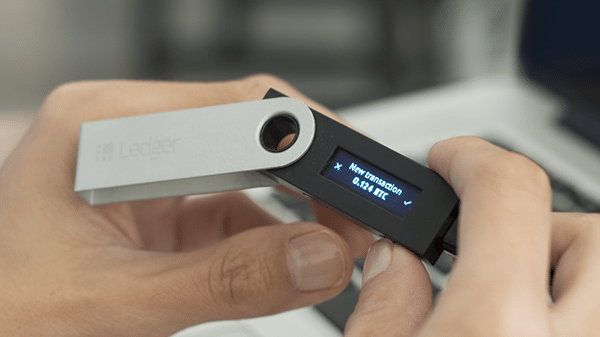
Platforms: Mac OS, Windows, Linux, iOS, Android
Coins: 1184 (BitCoin, XRP, Ethereum, BitCoin Cash, Monero, Dash, etc.)
| Pros | Cons |
|---|---|
| ✅Upper hand design ✅Reasonable price ✅Secure ✅Supports multiple coins ✅Accepts crypto transfers even being offline ✅Ease of use |
⛔Not mobile-friendly ⛔Less intuitive ⛔Must be always taken with and can be lost or stolen |
Ledger has produced the first and the only certified hardware crypto wallet which has been created for token owners for whom the security of their assets is critical. It is the company which has produced 4 wallets which are sold in 165 countries. The hardware wallet can be accessed both from PC and mobile devices since there are free apps to download and install. There are the latest security features which are constantly updated, a possibility to check real-time balances and multiple counter values supported. Wallet owner can manage the account as well as look through the full transaction history and add new or existing accounts.
The latest and most advanced model of the wallet Ledger Nano S Experience is a small and compact device with the metal casing. When you plug in the wallet into your computer for the first, you will set up a PIN and get a 24-word phrase which serves as a private key to it. When you install the software, it is ready for use. It will take only a couple of minutes to get used to it thanks to the simplicity of its interface.
The wallet is operated by two buttons which can be used for typing your PIN, inputting recovery words, checking your balance, and confirming transactions.
2. Coinomi – Best for Mobile
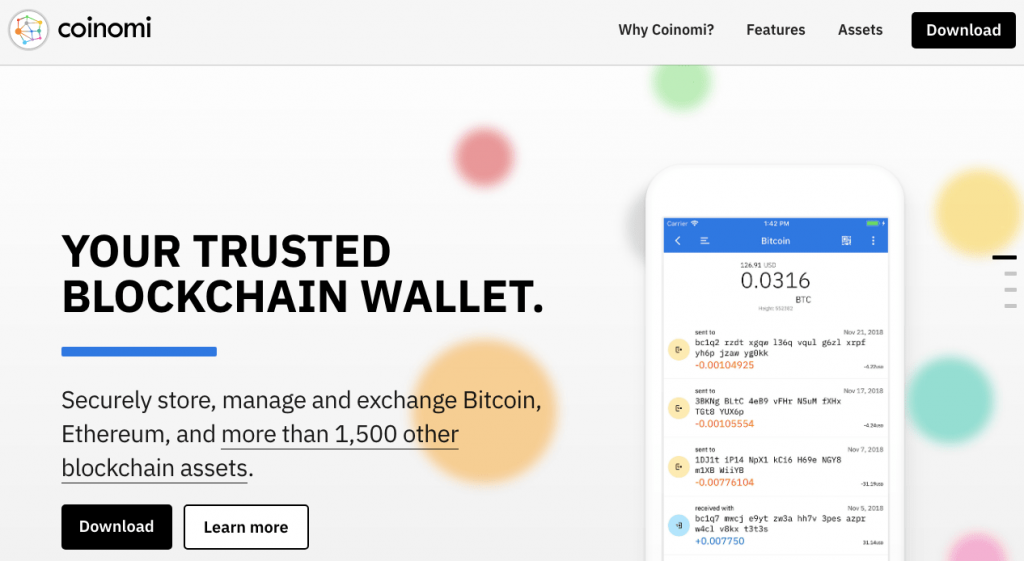
Platforms: Mac OS, Windows, Linux, iOS, Android
Coins: 125 cryptocurrencies and 382 tokens (Bitcoin, Ethereum, Ripple, etc.)
| Pros | Cons |
|---|---|
| ✅Superb security ✅Custom and dynamic fees ✅Fast and cross-platform ✅Streamlined and user-friendly |
⛔No support of KYC mechanism ⛔Updates of the public code |
Coinomi is a multi-asset ‘hot’ wallet founded in 2014. It has millions of active users and has never been hacked. There are 168 currency representations to be read in 25 languages and exchanged instantly anytime. The wallet works perfectly both on a computer and mobile devices on all popular platforms. It can also boast support and the biggest ownership for more than 125 blockchains and thousands of tokens.
The wallet features built-in exchanges, enhanced privacy, one-time backup, and native SegWit. Users can adjust the interface according to their mood and will appreciate the simplicity and comfort of its use.
3. Exodus – Best for Desktop
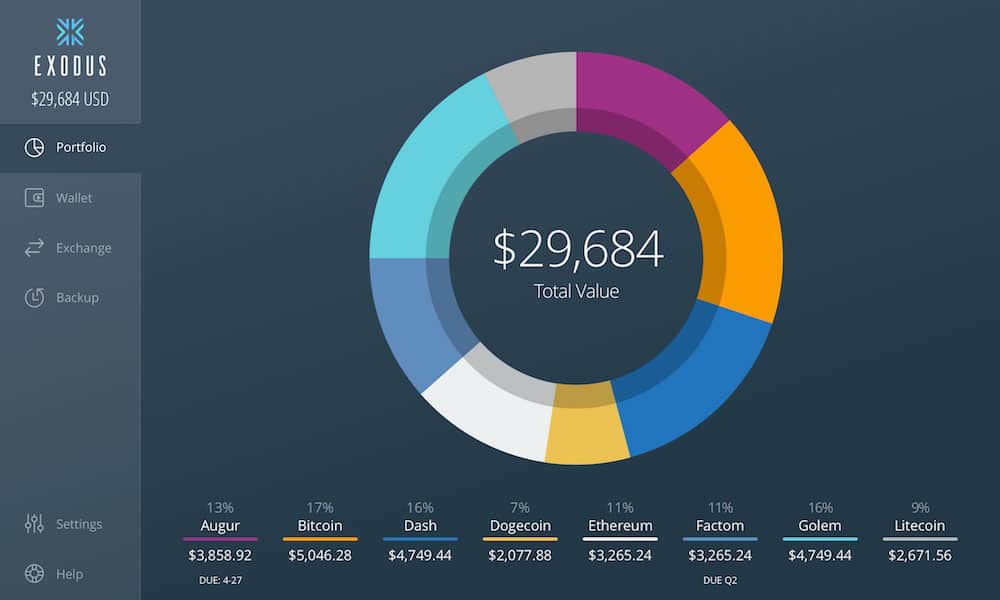
Platforms: Windows, Mac, and Linux, iOS and Android
Coins: 100+ (BitCoin, BitCoin Cash, Ethereum, Monero, Dash, LiteCoin etc.)
| Pros | Cons |
|---|---|
| ✅Built-in exchange ✅Technical excellence ✅Functional mobile app ✅Portfolio management feature |
⛔Absence of the web wallet |
Exodus is an anonymous multi-asset crypto wallet. According to the official website, the wallet supports over 100 assets and has both a desktop and mobile version. There is a user-friendly interface which will be clear even for beginners. Apart from standard transactions, it is possible to exchange crypto too.
Since Exodus is a desktop wallet, there is no need to register in it. It is enough to download the software and install it on your computer. Exodus is synchronized with online servers and does not require verification from users.
There are live charts and portfolio of all crypto assets on the platform as well as round the clock customer support to answer all the user questions any time of the day. The portfolio management feature allows seeing all the assets owned at first glance. The mobile version of the wallet is synchronized with the desktop app and allows following the market movement on-the-go. It is also compatible with Trezor hardware wallet for more advanced security of huge crypto amounts.
4. Coinbase – Best for Buying

Platforms: iOS and Android, Windows, Mac, and Linux
Coins: 20 (Bitcoin, Bitcoin Cash, Ethereum, Ethereum Classic, Litecoin, TRON, and BAT)
| Pros | Cons |
|---|---|
| ✅Crypto holdings are insured ✅2-step verification for better security ✅Secure storage ✅Reputable and trusted |
⛔A limited number of tokens ⛔Is not suitable for storing large amounts |
Coinbase is an online wallet to be created on the popular exchange platform which also offers to buy crypto. Despite the fact that the number of coins supported is not very big, you will easily find the leaders of all ratings there.
Unlike many other online wallets, all the assets owned and stored on the platform are insured that is why this wallet is often compared to a bank. Moreover, you can access your wallet using a web browser on the computer and a mobile application available both on Google Play and App Store. There is even a possibility to earn cryptocurrency by answering questions, solving bounties and participating in communities.
The wallet allows sending and receiving crypto only by indicating the name of the Coinbase wallet holder.
The wallet takes control of all the private keys and offers three types of wallets to create: wallet, vault, and multisig vault. All of them differ in the levels of security applied to the wallet. It is also possible to open a USD wallet on Coinbase too.
5. Blockchain.com – Best Online Wallet

Platforms: Android, iOS, Windows, Mac, and Linux
Coins: Bitcoin, Ether, Bitcoin Cash, and Stellar Lumens.
| Pros | Cons |
|---|---|
| ✅Easy to use ✅Great customer support ✅The user interface is easy to navigate ✅Protects individual privacy ✅Possibility to buy and sell crypto directly in the wallet |
⛔A limited number of tokens ⛔Long verification process |
Having entered the blockchain industry as Bitcoin block explorer, the platform has gradually grown into a wallet with the motto ‘Be your own bank!’. There are over 40 million wallets with the transaction volume of $200 billion. There are low commissions and excellent security to prevent the unsanctioned access to your assets. You can choose one of three security levels to protect your account.
Being a web-based wallet, it can be accessed from any device and platform. There are great mobile apps for Android and iOS to access the wallet easily.
Blockchain wallet has a number of features that make it even more appealing. There is a built-in exchange and a ‘Lockbox’ feature to connect the online wallet to a hardware one. Recently, it introduced USD PAX to store digital dollars in the wallet.
6. Electrum – Best for Bitcoin
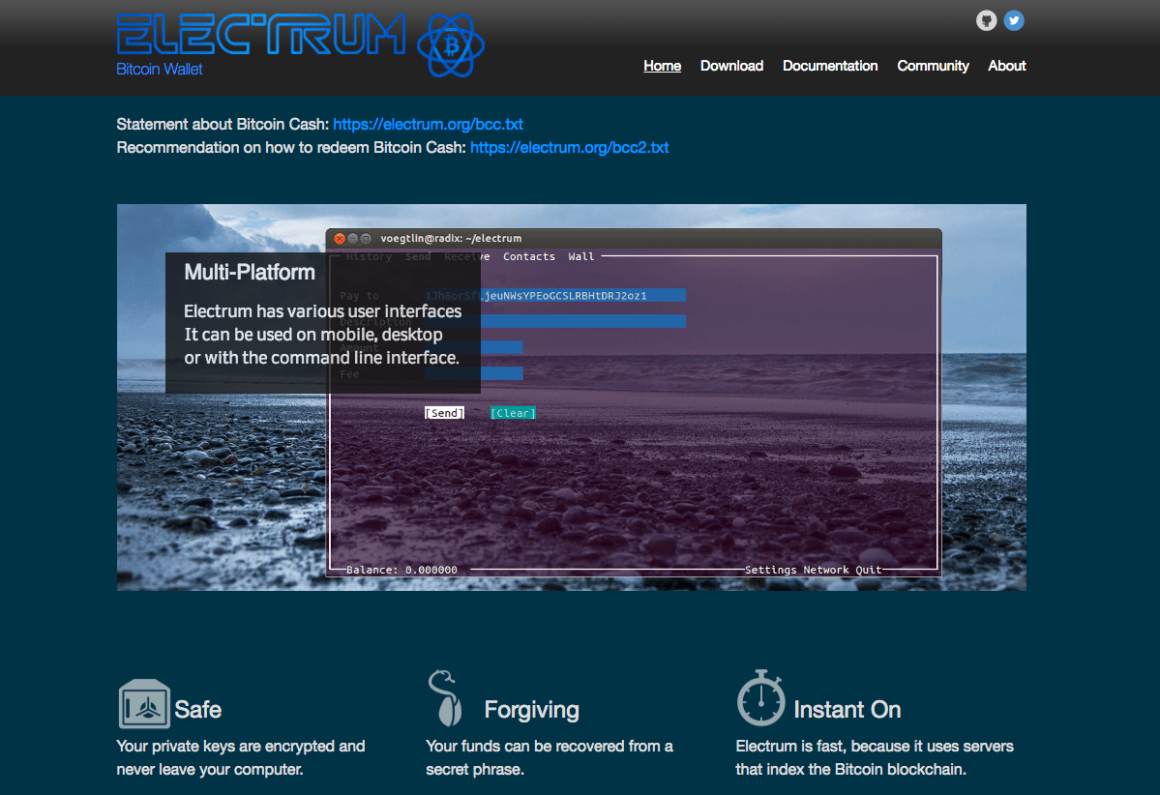
Platforms: Android, iOS, Windows, Mac, and Linux
Coins: Bitcoin
| Pros | Cons |
|---|---|
| ✅Fast, safe, and private ✅Trusted and widely used ✅Integrated with hardware wallets easily |
⛔Supports Bitcoin only |
Electrum is one of the oldest crypto wallets in the market launched in 2011. Now it is considered number-one BitCoin wallet which takes 10% of all BTC transactions. Being focused entirely on BitCoin, one of the best features of this wallet is easy integration with major hardware wallets for improved security.
Users can access Electrum through the browser both on a computer and mobile devices and download mobile apps if necessary. The transaction fee has a flat rate of 0.2 mBTC, but in some cases, it can be reduced greatly.
The interface of the wallet is intuitively understandable making it a perfect choice for beginners as well. This wallet is also considered to be one of the most secure ones thanks to the encryption techniques used.
7. WalletGenerator – Best Paper Wallet
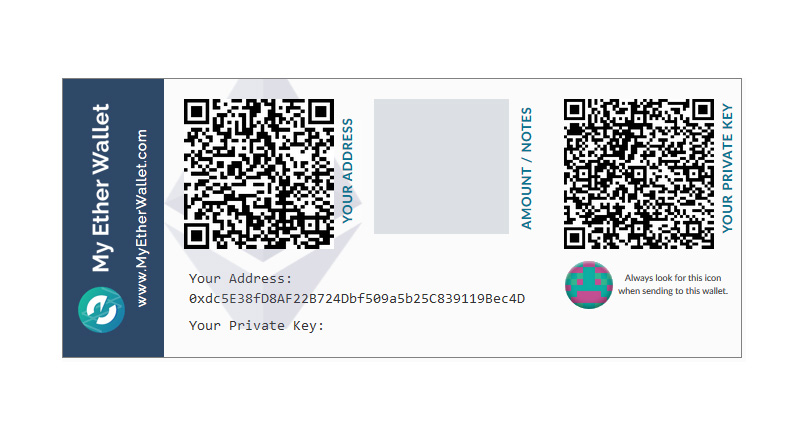
Platforms: Windows, Mac
Coins: 197 (Bitcoin, Cashcoin, Litecoin, Emerald, Dash etc.)
| Pros | Cons |
|---|---|
| ✅Not subject to malware and keyloggers ✅There is no need to rely on third-party services to coin protection ✅Is not dependent on devices |
⛔Can be lost or taken by someone |
WalletGenerator is an open source app which allows generating crypto paper wallets. To make a paper wallet, one must download the website from GitHub open the index.html file directly on the computer. It will enable a user to generate a new address and print a paper wallet with a QR Code. It is necessary to share the public address if you want to receive crypto to your paper wallet.
To be able to spend coins stored in the wallet, it is necessary to improve the holder’s private key in a real client which can be downloaded from the website. Any bugs can be solved using GitHub or users can contact a customer support team via Twitter.
How to Keep Your Wallet Safe
Safety is one of the main characteristics of a trusted and reliable crypto wallet. However, not only a platform is obliged to keep your wallet in 100% security since some measures must be followed by the holder too. If you are interested in keeping your crypto assets in absolute security, follow these tips and you will be more confident in the safety of your funds.
Make a choice of the crypto wallet reasonably
It is very important to evaluate several wallets before you decide which one to select. You can read reviews, feedback of other users, ask for the wallet legitimacy on forums, research which security features are offered by every wallet and how often these measures are improved by the development team.
1. Don’t neglect 2-factor authentication
Some wallets offer it as another level of security which can be chosen as an alternative. If a wallet has this feature, enable it undoubtedly.
2. Be careful picking a password
We use passwords on multiple platforms but your password to the wallet must be unique. Moreover, your username, PIN, and password should be strong.
3. Prefer multi-sig wallets
Multisignature wallets require from other users to sign each transaction in addition to the private code use. Naturally, it will take more time to send crypto in this way but your decision will be evaluated by one more person.
4. Update antivirus protection regularly
It is very important to secure your device with the latest antivirus software to prevent any malware attacks.
5. Make regular updates of the wallet software
Modern wallets are constantly improved by their developers so he updates usually have improved security protection.
6. Backup your wallet
Nobody is insured against breaking or loss of the devices, so a wallet backup will be your key to recovering your funds.
7. Check the address before sending funds
Any misprint can cost you a great amount of currency.
8. Never access your wallet via public Wi-Fi
It can open secret information to criminals.
9. Store your holdings on several wallets
It is preferable to keep small amounts of tokens on online wallets and bigger amounts must be stored on paper and hardware wallets.
10. Keep your private key in a secret
Any sharing of such important information as a private key can cost you all your savings in cryptocurrency. It is better to choose wallets which give full control of the keys to the wallet holders.
Conclusion
One of the decisions which should be considered very well before being made is undoubtedly the choice of the wallet for money, especially if it is digital money which can be stored nowhere except for a wallet. The reliability of wallets for cryptocurrency can be checked only with time. There are services which have found approaches on how to protect from attacks and save their users’ assets. That is why this list of the best cryptocurrency wallets includes only reliable websites checked by time and thousands of users from different corners of the world.

